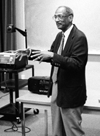

When Visiting Professor of Psychology Ferdinand Jones thinks of Jazz, he is not only grinning about the beat but also about its history and cultural meaning.

"Jazz is one of my passions," said Jones as he tapped his foot to the beat of pieces by artists such as Abby Lincoln and Sonny Rollins. Jazz tunes were an important part of Jones' talk, which was entitled "A Psychologist's Commentary on Jazz and Resilience in African-American Culture."
Jones, professor emeritus of Psychology at Brown University, taught a two-credit course called "Cultural Mistrust" during the first module of this semester. As a way of wrapping up his time in Oberlin, Jones shared his personal research on jazz as an African-American cultural medium.
Jones' passion for jazz and longtime career in the field of Psychology as both a clinical psychologist and professor led him to explore how "jazz [can be used as] a metaphor...for the adaptation of African-Americans to their oppressive circumstances in North America."
According to Jones, it is necessary for all oppressed groups to understand their condition and culture as well as learn how to deal with life in order to adapt and overcome adversity.
"You can hear the resilience in the music," Jones said. Jones believes that expressions of creativity such as jazz are indicative of people's success in overcoming oppression and enslavement. Jazz exemplifies African Americans'"abilityto make...interpretations of their existence," Jones said.
A "major mental health property of the African-American culture" is what Jones called the "attitude of challenge." Embracing this attitude leads African-Americans, in this specific case, toward the line of thought that racism in North America does not propagate the truth and that, in fact, many racist stereotypes and ideas may be the opposite of the truth. This "attitude of challenge" is expressed in part by the jazz idea that "music is to be played with," according to Jones.
Jones actually sees jazz as representing the definition of African- American because it "describes, parallels, [and] illustrates" African-American experience. He stressed jazz over other art forms, such as literature, because the "oral tradition is seminal in understanding African cultural heritage."
For Jones, "there is a dimension in which all forms of African-American music are related." Spirituals, blues, Gospel music, jazz, ragtime, and rap are all African-American musical forms between which "the lines are blurred."
In defining jazz, Jones stressed its "soul" as well as its roots in the blues of rural Southern communities. "If there's no blues element, then it's not jazz," he said.
The blues then became "harder" as more and more African- Americans moved to the cities and eventually it picked up the use of rag musical structures. According to Jones, when you add syncopation of music to "blue" notes, you get jazz.
In describing how to learn jazz and understand improvisation, Jones said to "go to the source...If you learn to play jazz, what you learn is how to play something that comes out of black culture."
Jones said there is a lot of emphasis in American culture on what's black and what's white. He acknowledges separate white and black jazz histories but said, "I don't think you have to be black to play it or listen to it...[but you have to be] open to learning it and open to unlearning other things."
The psychology of music: Ferdinand Jones spoke Wednesday about the culture of jazz in African-American history. (photo by Zach Fried)
Copyright © 1997, The Oberlin Review.
Volume 126, Number 6, October 10, 1997
Contact us with your comments and suggestions.